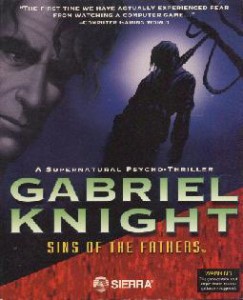This post isn’t about adventure games. It only reads that way.
For four decades, the adventure game genre has been practically synonymous with “story-driven” video games. In the early 1980s, Infocom was trading in thought-provoking, experimental text-only narratives while pioneering role-playing game series like Ultima and Wizardry were still fumbling with the basics. (We won’t even talk about contemporary narrative in other genres.) By the 1990s, non-adventure games had become more competitive in the storytelling sphere, but companies like Sierra and LucasArts were still where gamers went when they wanted “pure” interactive narrative that eschewed complex combat mechanics or action sequences.
Times have cha nged. The adventure game genre is still around, but is no longer a dominant industry force. Now even first-person shooters and other action games are marketed with a strong emphasis on story.
nged. The adventure game genre is still around, but is no longer a dominant industry force. Now even first-person shooters and other action games are marketed with a strong emphasis on story.
What hasn’t changed is the way story and gameplay are separated in most games. We continue to see games structured as a sequence of story moments broken up by gameplay challenges (or vice-versa), whether those challenges are comprised of elaborate combat systems, exploration and discovery, or object interaction puzzles. Sometimes the line between story and gameplay is perfectly blurred or the transition made seamless; more often, it’s stark. Continue reading →

 Just a brief update: My latest short story, “Ten Confessions of Blue Mercury Addicts, by Anna Spencer” appears in the March / April issue of venerable British SF magazine Interzone. You can purchase the hardcopy edition of Interzone #263 at the
Just a brief update: My latest short story, “Ten Confessions of Blue Mercury Addicts, by Anna Spencer” appears in the March / April issue of venerable British SF magazine Interzone. You can purchase the hardcopy edition of Interzone #263 at the  nged. The adventure game genre is still around, but is no longer a dominant industry force. Now even first-person shooters and other action games are marketed with a strong emphasis on story.
nged. The adventure game genre is still around, but is no longer a dominant industry force. Now even first-person shooters and other action games are marketed with a strong emphasis on story.